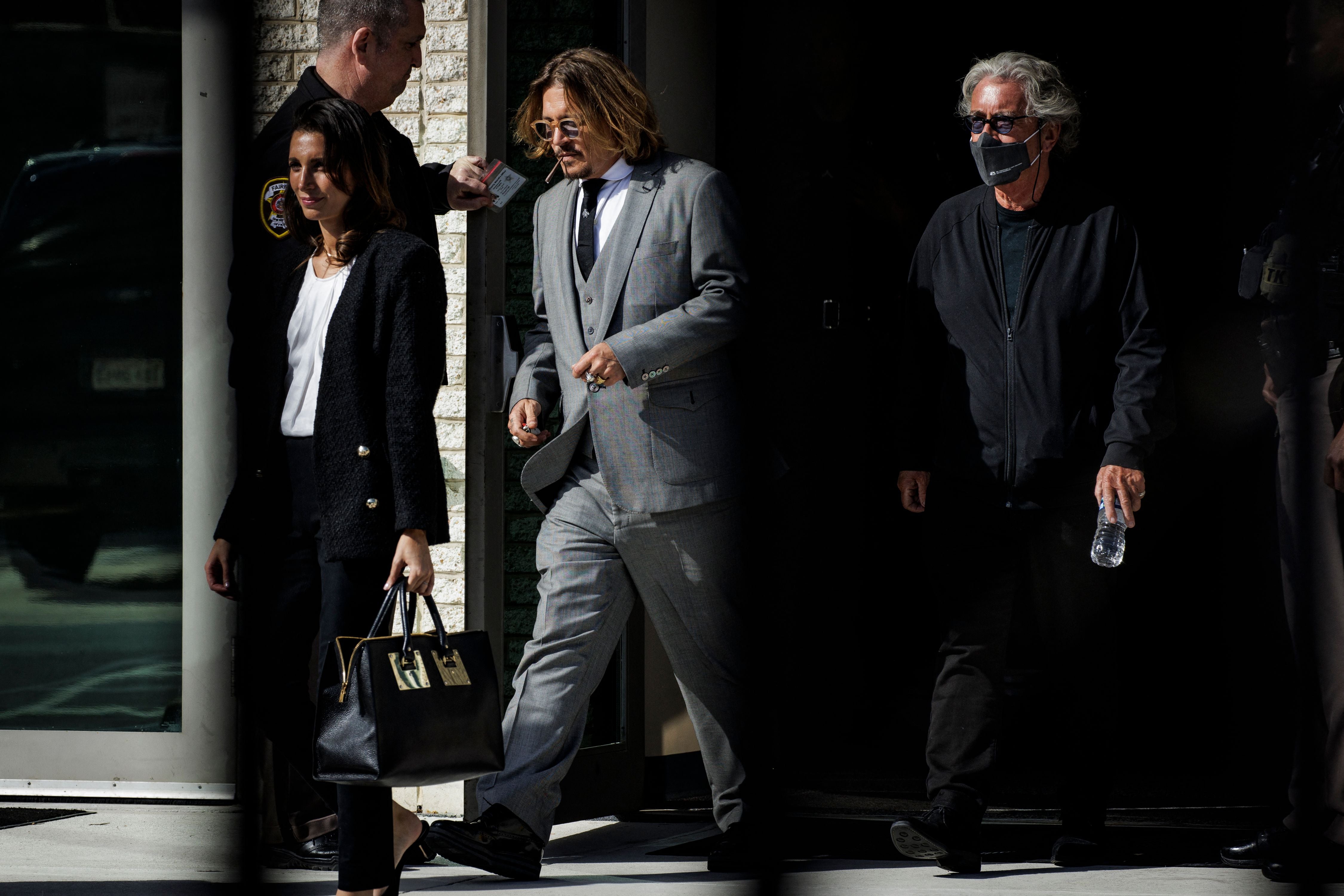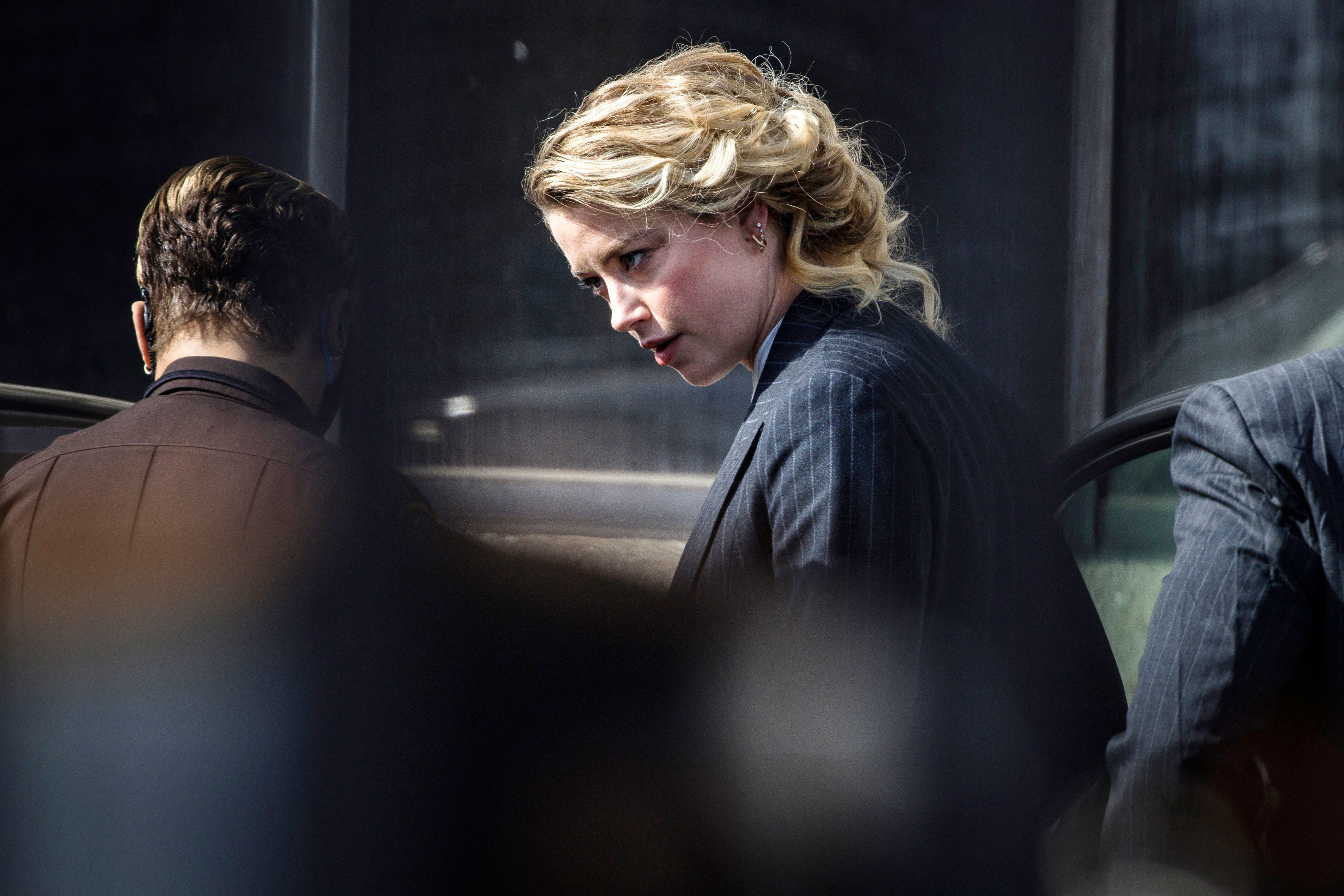Johnny Depp v Amber Heard trial opens in Virginia with fans, stars, and a flurry of questions
Johnny Depp and Amber Heard were both present for the first day of the defamation case opposing them in Virginia, Clémence Michallon reports from Fairfax


Your support helps us to tell the story
From reproductive rights to climate change to Big Tech, The Independent is on the ground when the story is developing. Whether it's investigating the financials of Elon Musk's pro-Trump PAC or producing our latest documentary, 'The A Word', which shines a light on the American women fighting for reproductive rights, we know how important it is to parse out the facts from the messaging.
At such a critical moment in US history, we need reporters on the ground. Your donation allows us to keep sending journalists to speak to both sides of the story.
The Independent is trusted by Americans across the entire political spectrum. And unlike many other quality news outlets, we choose not to lock Americans out of our reporting and analysis with paywalls. We believe quality journalism should be available to everyone, paid for by those who can afford it.
Your support makes all the difference.Justice begins in French – in Fairfax as in other jurisdictions in the US. Voir dire, the process through which prospective jurors are evaluated, took place on Monday (11 April) in the defamation dispute opposing Johnny Depp and Amber Heard. Both actors were present at the Fairfax County Circuit Court, marking the opening of a case that brought celebrities, journalists, and a host of supporters to the Washington DC suburb, 2,500 miles from Hollywood.
Fans showed up early, competing with members of the press corps for neon pink wristbands which, that day, guaranteed entry to an overflow room in which the proceedings could be followed live via video link. This setup was specific to day one, and to the jury selection; in the coming days and for the duration of the trial, members of the public will be allowed inside the courtroom, from which the case will be televised. Depp fans brought placards and flowers, in a setup reminiscent of Depp’s trial against The Sun in the UK. (The actor sued News Group Newspapers, the company that publishes the newspaper, for alleged defamation over a headline calling him a “wife beater”; he lost that case in November 2020 as a judge deemed the allegations against Depp “substantially true”.)
During the London case, Depp was known to occasionally greet fans outside of court, at times collecting gifts and flowers from them. Heard, a witness in that trial, was also seen waving to supporters and being approached by fans. The rules in the Virginia case proved different from the onset Judge Penney Azcarate, who is in charge of the proceedings, has asked Depp and Heard not to pose for photos or sign autographs outside the Fairfax County courthouse. Both made discreet entrances on Monday and were only briefly photographed at the end of the day.
Depp has sued Heard, his ex-wife, for $50m over an op-ed she wrote in 2018 for The Washington Post, titled: “I spoke up against sexual violence — and faced our culture’s wrath. That has to change.” In it, she writes in part: “Like many women, I had been harassed and sexually assaulted by the time I was of college age. But I kept quiet — I did not expect filing complaints to bring justice. And I didn’t see myself as a victim. Then two years ago, I became a public figure representing domestic abuse, and I felt the full force of our culture’s wrath for women who speak out.”
Depp isn’t named in the piece, but he has contended that it defames his character and has asked for $50m in damages. Heard has filed a $100m countersuit in response to Depp’s lawsuit, accusing him of allegedly orchestrating a “smear campaign” against her and describing his own lawsuit as a continuation of “abuse and harassment”.
Among the chief concerns for Depp and Heard’s legal teams on Monday was the need to find jurors who could rule in the case impartially, despite the global fame of both parties. Both actors wrote three-piece suits: Depp’s gray, Heard’s pin-striped. Depp sat to the left of the courthouse, surrounded by a group of legal advisers; Heard sat to the right with her own team. Eleven jurors had to be picked out of a pool of 41 potential jurors (with an extra 40 people available if needed).
Judge Azcarate began by telling prospective jurors that serving on a jury is their duty as American citizens; she would grant relief to some of them if sitting through six weeks of proceedings were to cause them personal hardship, but in some circumstances only. (The trial is expected to last six weeks, running Monday through Thursday from 10am to 5pm, with a morning break, a lunch break, and an afternoon break. Jurors won’t be sequestered, though they are barred from discussing and researching the case throughout the proceedings.)
Prospective jurors who had already booked travel for the upcoming six weeks were excused, as were those who needed to care for relatives. Those arguing that being away from work for six weeks would create complications for themselves or their employers, however, were asked to stay.
Then came the question of neutrality. Some of the potential jurors summoned on Monday for jury duty had an inkling they might be asked to sit on the Depp v Heard case; several said they had no knowledge of the case prior to Monday morning. It was acceptable for prospects to know some of the facts of the case, Judge Azcarate told them, they just needed to say whether what they knew would affect their ability to make impartial decisions. Their neutrality would have to be preserved throughout the trial, too; to that end, they were asked to immediately deactivate automatic media notifications on their cellphones.


Several prospective jurors had read headlines about the dispute but said they held no strong opinion about the case or either party. Lawyers’ attempts to suss out each person’s knowledge and possible bias led to some awkwardness: imagine having to state publicly, in front of Johnny Depp, whether you like or dislike Johnny Depp for any reason, or how many of his movies you’ve seen, or whether you’ve heard of him before. One man, having told the court his wife had texted him about the case, was asked to read the exchange out loud; it included strong, speculative language regarding one of the parties’ perceived mental state. Another person pointed out that the amounts of money at stake in the dispute were far higher than any level of wealth she could have personally related to.
There was a lunch break. Then, more questions for the prospective jurors, all in the interest of whittling down the pool: did they understand English? Had they ever been convicted of a felony? Were they all US citizens?
Depp’s lawyer asked a series of questions, seemingly all aimed at weighing the prospects’ neutrality in a variety of areas: how many of them followed stories about celebrities? How many of them read opinion pieces? How many of them had read about Depp? How many of them had seen his movies? How many of them had never seen a Depp movie, or just one? How many of them had ever seen a movie with Amber Heard? Were they members or participants of any group that identifies with the Me Too movement? Did they think that a person sharing an account of abuse or sexual assault should be believed without questions? Did they believe that people rarely make false accusations of abuse or sexual assault?
Heard’s attorney had questions of her own: How many of the prospective jurors had seen at least three films with Depp? Five? Seven? Any commercials, for example his campaign for the Dior Sauvage cologne? How many had a favourable opinion of Depp? Did the potential jurors believe people act the same in public as they do in private? Had any of them seen Heard in Aquaman? In a L’Oreal commercial? How many of them had a favorable or unfavorable opinion of Heard? Did anyone have a negative view of The Washington Post? Did anyone have a negative view of op-ed writers? Did anyone believe that if a spouse hits their partner, that person should not hit back or otherwise defend themselves? Did anyone believe that a victim of domestic violence should immediately leave their abusers, and that they were as much to blame if they stayed? Did they believe that jealousy could lead to domestic violence? Did anyone believe that actors cannot be believed? Did anyone know what the Daily Mail is? Did anyone have an opinion about what’s reported in the Daily Mail?
After the questioning, each lawyer used their respective strikes to eliminate some jurors. In the end, 11 people were selected: seven jurors and four alternate jurors, who will step in should one of the seven leads need to drop out for any reason.
The Depp v Heard trial is expected to last a total of six weeks. Potential witnesses include Elon Musk, James Franco, and Paul Bettany, who could all participate via video link. Heard and Depp themselves are expected to testify as well.


